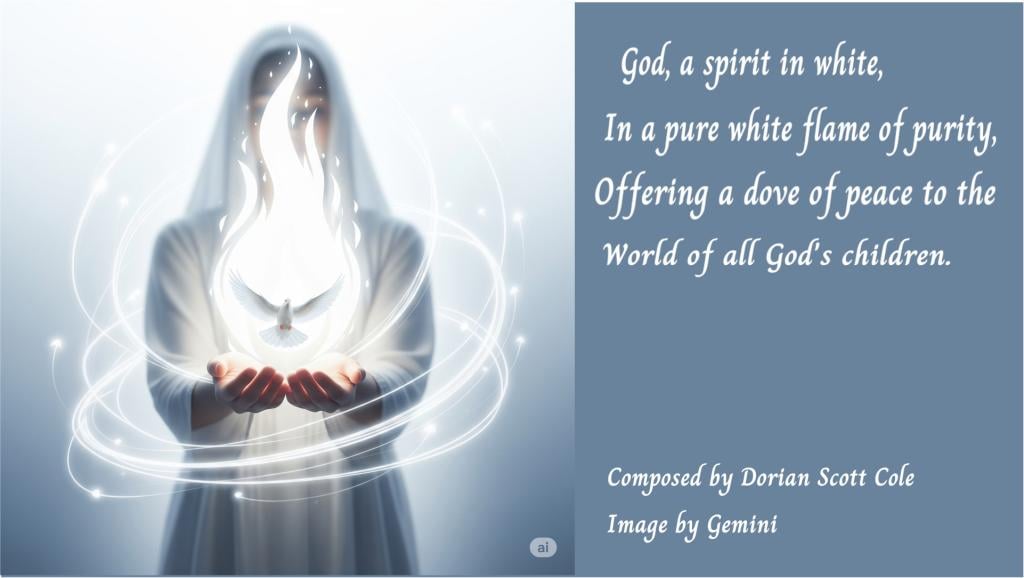Why did God let that happen?
Part 2 of the Daddy, why is there God? series
Is God an old man sitting on a throne with people bowing before God, issuing deadly thunderbolts in judgment? Is God a “mother” as in some ancient religions? Is God a spirit?
Even small things, like paternal characterizations and inherent biases, influence what we expect from God.
Podcast show links with added content: Substack, YouTube video, Spotify, and Apple podcasts. These appear a day after blog-article posts.

composed by Dorian Scott Cole, image by Gemini.
Bible verses that apply to this article
Apostle John: God is love (1 John 4:8 and 4:16), God is Spirit (John 4:24), God is logos (the word, John 1:1-18).
God as our parent
I often use the parent-child relationship to explain our relationship with God. I also refer to the apostles’ journeys of faith. This approach, alongside examining the apostles’ journey of faith, helps set our expectations of God and understanding what God will do for us.
We are children of God. We can identify with this relationship as parents of our own children. We love to watch them develop as they take their first steps and say their first words. We hope those first words are mommy and daddy, or some derivative. Our first daughter’s first word was cow. C’est la vie (such is life).
As our children grow, we guide them. At first, we’re micromanagers. Then we learn to let them loose, especially with our second child. We learn that children need to make mistakes and suffer the consequences. But they don’t need to get run over by cars. We try to steer them clear of dangers.
As they become more independent, explore life, and place their own needs first, they’re going to be naughty and do things that hurt others. They have to learn, so we are hesitant to intervene. Once they earn our trust, we can give them rules about staying out of the street.
We can give them rules about hurting others and talk to them about sharing with others and being considerate of others’ feelings. The Bible teaches these things as love. Love doesn’t hurt other people. Love is what God expects us to do for others.
Through all of this period of growth we support them with food, lodging, education, recreation (time to recreate), guidance, and most of all love.
As they mature, we admire the wonderful things our children do. We revere their child-rearing skills, their careers, and their love for others.
We never finish our parenting jobs. We’re always available for advice and support.
These are the things God does for us, except in exceptional times like in 2024-25 Gaza where cruelty from others appears to be condoned and ignored.
By following the guidance that God sets out for us, through the example of Jesus and others, we learn profound lessons about how to treat others. This sets us up for good relationships with others, and smooths our path to successful outcomes.
Having studied God for decades and reflected on what God tries to teach us, I can only see God as a loving parent. This is how Jesus saw God and referred to God in the more familiar “Daddy” (meaning intimate, family, close friend).
We are made in the image of God. This means spiritual image, not two legs, two arms, and two heads like most of us.
Among the many ways of understanding or defining God, as if God is subject to human understanding and can be defined, I think “parent” may be the best term. But let’s look at some other ways of understanding God.
The Apostles’ growth
The apostles are an example to us. They followed Jesus, revered him, and learned his teachings. Then Jesus’ execution threw them into confusion. Even they didn’t understand the bigger picture, despite Jesus telling them, and despite all they had learned and marvelous things they had done. In their mass confusion, they hid. So how much more difficult is it for us to understand what God is working to accomplish?
Jesus, as a good parent, came to them. He told them where to go and what to do there. He gave them the Holy Spirit, which was also given to all of us as a comforter and guide. Then after affirming their missions and giving them help, he left them.
Making decisions was difficult. At first, they used things like the Urim and Thummim, or dice, simple mechanical devices of chance, to make decisions without thinking them through.
Paul and the others wrestled with deep theological issues about what sin really is. When working with non-Jews, Jewish law had to be set aside for love, as Jesus taught them.
Eventually they acted out of love for others and looked for God to open doors for them. Of course, they had to push on the doors, which meant it took some effort and they risked their lives. They stayed the course, learned, and accomplished their missions.
We all start life as children, and God expects us to develop beyond childhood thinking and behavior as we mature. When we use love as a guide, things often fall into place for us. God doesn’t need to shout in our ear, we just know what the right thing is to do.
Okay, some decisions are very difficult so we need others’ advice. Sometimes the best thing is to do nothing, and sometimes there are tradeoffs even if love is our guide.
God as a universal or collective consciousness
What if God is a production of the entire universe. Or a projection of all humanity? Could God originate from the civilizations on the billions of other inhabitable planets that could support life, from billions of years ago to today. Perhaps even multidimensional entities could have collective thought and experience-based wisdom.
This God would permeate all of reality, existing in every person and everything. Nothing would be outside God’s presence. All experiences would be known to God, and even the future might be known. God would be the ultimate source and sustainer of all creation. Every individual consciousness, including animals and all life, would be known to God.
This cosmic mind would be the creator of all order and design, manifesting reality. This conception of God represents the ultimate state of joy.
God in this conception is less personal. Perhaps God would be something like the laws people have found necessary to maintain civilization. A good example is humanism.
Critique: In these theories it’s uncertain whether consciousness and the universe are produced by God, or if a universal consciousness, expressed as God, is created by people’s collective consciousness.
This also leaves the question open of how individuals create individual consciousnesses without being swamped by the collective.
Quantum entanglement might be a mechanism of consciousness, but so far there is no testable theory.
Humans tend to be anthropomorphic, seeing human traits in things that aren’t human. Is universal consciousness just another anthropomorphic gesture?
It’s interesting and even fun to think about this. However we have to ask if this theory helps in our understanding of God, or our critiques of God? What would be the benefit of a universal consciousness as opposed to God? What is the evidence for it?
Is there more evidence for a universal consciousness than there is for God? Neither has scientific evidence, but science has great difficulty dealing with a multitude of unknown parameters, so can’t test these theories.
Is God a mother, father, or beyond gender?
God as a mother figure
In ancient history and today, people often conceive of God as a mother spirit, embracing the idea of creativity inherent in bringing life into existence as mothers do.
Gaia, from ancient Greek mythology, was considered Mother Earth and from an egocentric perspective gave birth to the universe, gods, and all that’s in it.
Nut, the sky goddess from ancient Egypt, gave birth to the sun god, Ra, the universe, and nourished the dead to life in the afterlife.
In the ancient Hindu religions, Devi is the great mother, the universal creative power. She also represents destruction.
Tiamat, in Babylonian creation myths, is the goddess who created other gods.
Goddesses are also connected with giving and sustaining life, including human and agricultural fertility. These goddesses include Demeter (Greek), Isis (Egyptian), and Sybele (Roman).
Goddesses were also connected with protecting and nurturing. For example, Hathor, in Egyptian lore, was responsible for music, joy, fertility, and motherhood. Such goddesses are also widely found in indigenous religions.
Ma’at, which is more of a concept than a goddess, was responsible for justice in Egypt, and the idea of weighing a person’s deeds in the afterlife.
Sophia, in Gnosticism (mostly Christian), is responsible for wisdom and creativity.
The feminine figures reflected a deep respect for creation, sustenance, and life. They helped people understand their place in the universe.
God as a father figure
When monotheistic religions portray God as a father figure, God reflects all of the feminine characteristics listed above.
Add to these the characterizations of law-giver, teacher-and-guide, unconditional love, disciplinarian, and personal relationship.
The name of God in Hebrew
Ancient languages are difficult, and I leave interpretation to qualified scholars who spend years on this work.
From others, I understand the following about Hebrew words for God:
Ancient Semitic languages, from which Hebrew and later Aramaic derived, used the words “il, el, and al” to refer to God. The three were likely the same word, just nuanced pronunciations in different geographical areas and times.
To understand how pronunciations change over time, consider the example of the word Versailles. The French word Versailles is pronounced ver·si·uh in French, with the uh moderately suppressed. It’s vuh·sai in the UK and anglicized to Ver·sales in many areas in the US, such as Versailles, Kentucky.
It’s the same for words for God. The Canaanites, who spoke a Semitic language derivative, used both Il and El to denote God. El was also the specific name of a deity, the supreme god of the universe, who was lord over other significant deities including Baal, Anat, Astarte, and Dagon.
The words il and el are not gender identifiers like the personal pronouns he and she. They are simply like our word “God”—more of a title than a personal pronoun. Because vowels in Hebrew are weak, they allow Hebrew pronunciation to change over time. The unshown vowel can change, but the recorded consonants indicate the same meaning.
Putting “el” before a word in Hebrew simply means God, as in El Shaddai, meaning God Almighty.
The meaning of the verb YHWH
The word YHWH (Yahweh), which became popular in Christianity in more recent centuries, comes from Moses’ encounter with God on Mt. Sinai. The Midianites who Moses stayed with were a tribal descendant of Abraham, who is looked to as the father of the great nations of Judaism and Islam. (Nations means people, not necessarily geographical boundaries.)
““Thus you shall say to the sons of Israel, ‘I AM has sent me to you.’” God, furthermore, said to Moses, “Thus you shall say to the sons of Israel, ‘The Lord, the God of your fathers, the God of Abraham, the God of Isaac, and the God of Jacob [lineage of Abraham], has sent me to you.’ This is My name forever, and this is My memorial-name to all generations.”
– Exodus 3:14-15
The letters “YHWH” have been found over iron smelters in the Midianite region. The Midianites worshiped the God of Abraham, as did Moses. Abraham called God El Shaddai (“God Almighty”) and Yahweh (“the Lord,” also pronounced Jehovah).
The letters YHWH are often translated “I am who I am.” YHWH is not a noun, as in the usual case of a name, but does take a masculine form. YHWH is a verb. Verbs indicate experience, action, and an active state of being.
Is “I am who I am” give a full, meaningful, rendering of this verb? YHWH may represent a combination of the past, present and future forms of the verb ‘to be.’ It could mean the eternal one. Or maybe it could be like with Popeye the Sailor who said, “I am what I am and that’s all that I am.” He also said, “Open says me!” Instead of “Open Sesame.”
Popeye also said, “That’s all I can stand ‘cause I can’t stand no more,” so I’ll shut up about Popeye. Popeye was powerful, but God is surely more powerful and enigmatic than Popeye.
Anyway, the verb YHWH (to be) is an enigma, as probably appropriate for something that is beyond our ability to comprehend. We might want to think about the final H in the verb which is a common suffix in Hebrew that indicates formation, as in “ever-growing place of, ever-expanding house of.” YHWH meaning.
The idea presented by the verb YHWH as an action or experience, may be appropriate in that God is an experiential journey that involves interaction and active belief, not a fixed physical property represented by a noun. To know God is to experience God.
How do other versions of the Bible render the name of God? The traditional Jewish Hebrew Masoretic text, which was translated or refined by the Pharisees well after the time of Jesus, is written as ‘ehyeh asher ehyeh’ ( אהיה אשר אהיה ) and renders the name as, ‘I shall be what I shall be’. The older Samaritan Bible translation into English simply says “”The Name” or “The Name of God,” since it was considered taboo to pronounce the name of God.
The word “Elohim” was substituted for YHWH to avoid saying God’s name. Generally, the word “Lord” (Adonai) is used in the Bible to indicate God, rather than using God’s name. From the time of the Canaanites saying God’s name was considered taboo.
The word Lord is indicative of a relationship and a title, not a name. Language structure and usage trips us up. Unlike Aramaic, Hebrew, French, Spanish, Greek, and English, generally require a personal pronoun to accompany “inanimate things.”
For example, the word “chair” is masculine in Hebrew, feminine in ancient Greek, and Feminine in French. In English the word chair is an “it,” neither male nor female. English only applies personal pronouns or genders to living entities.
Personally, I don’t apply personal pronouns such as he or she to God. I just say God and try not to use the Supreme Being without reverence. Okay, I’m continuously guilty of irreverence.
Sorting out the history of pronouns as applied to God
Paternal cultures, such as Judaism and Christianity, tend to identify God with male pronouns and ascribe both male and female characteristics. Other cultures might have both male and female gods, each with distinct characteristics. Indigenous cultures often feature mother figures as gods. Many cultures have many gods responsible for different aspects of the universe, including many lesser male and female gods that people can relate to for specific needs.
In Jewish religion, like other religions, God was responsible for the development of law, mercy, forgiveness, and love. Then Jesus made God more personal by calling God “father” (abba) and eliminating the need for a priest to mediate the connection between people and God.
Adam and Eve, and our perception of God
Some consider the Adam and Eve story in the Bible to be about male dominance. In the beginning, they were one, but lonely, possibly reflecting God’s need for companions. God split off parts of God’s self to create and inhabit people. God split Adam, whether removing a side or a rib, so that Eve was an equal part.
At the fall, which I interpret as an unquenchable thirst for knowledge and people beginning to go their own way, Adam began to lord it over Eve and the ground became cursed. Chasing good and evil has inherent consequences.
Later Jesus brought humanity back together, reconciling us with God. There is no differentiation in God’s Domain–both are equal. The Domain of God (Kingdom) is now and forever, and those who follow Jesus’ way are in it now.
Jesus, our example, taught both men and women and mingled with them despite this being frowned on in Judaism. The Apostle Paul brought women into service to God. Neither of them minimized women or treated them as “less than.”
The Adam and Eve story is all spiritual reflection told by ancient people, not actual history. But it tells us that in the beginning people were very close to God. They drifted away after other things like knowledge of good and evil, and are driven farther away by their wrongs toward others. Then humanity found reconciliation with God through Jesus’ teachings. God gave Adam and Eve all they needed, and they were all companions and equals. This is as good as it gets and can be our expectation of God in our lives.
This story tells us about early conceptions of God and people’s relationship and expectations of God. When Adam and Eve ate the apple, they realized they were naked, which I interpret as spiritually vulnerable. They had done something wrong and tried to hide, wrapping themselves in clothes to become less vulnerable. They realized that their actions brought consequences.
Conclusion
What do we expect from God today? To confirm our biases? To hand out cash like marshmallows at a wiener roast? To make life easy? To solve all the problems in the world? To solve all our problems for us?
We’ll look more deeply at this in the next blog article. Still, solving all our problems for us is proven unworkable as seen in current generations whose parents solve all their problems for them. This is documented in studies, not criticism. They are unable to solve problems when they leave home for college or work environments. Not to criticize them–they have other strengths that are missing from previous generations.
We are led by the nose by Biblical interpretations that are erroneous and reflect translator bias. Even Jews and Christians don’t agree on many of these translations. Many Biblical passages are read in a way to support our own biases, such as paternalism in which only men rule and lead. Some men like total power in relationships, and when this occurs, the golden work of Jesus is poured into the sewer like mucked out horse stall manure.
Our expectations can be set by little things like personal pronouns that reflect nothing but language styles, such as the misleading addition of “he” or “she.” We need to watch for the little things that influence our interpretations and keep love at the front of our minds.
Coming in this series, we’ll explore what would we learn from a perfect life in a perfect environment where nothing and no one could cause harm to another? Is there is a divine group of powerful figures in Heaven? Why are we here? These are questions we’ll look at in this series.
Please subscribe to the newsletter to get notifications on future articles.
“With hate, we have more to lose than gain – break the cycle” – Dorian Scott Cole
“Our answer is God. God’s answer is us. Together we make the world better.” – Dorian Scott Cole
Probability Space
What probability spaces can we open in our minds to more deeply understand our expectations of God?
(A probability space is where all of the elements necessary for something to happen are present, the moment is pregnant with possibility, and a new something is almost inevitable. All it takes is intention.)
Potential Space
If you think creatively and allow your mind to wander and explore, how would you characterize God in your own life? Is he a dictator, a wise old man, the conscience of humanity, your personal ATM, a guide, a parental figure, or what? These help define your expectations of what God will do for you.
Would love to hear your thoughts in the comments below. This helps me improve my work.
Please subscribe to my Patheos Newsletter.
Below is information for church planning to minister to new generations, building a community of action, service opportunities, education opportunities for new generations, and descriptions of the author’s nonfiction books.
Some things that you might love
Would love to hear your thoughts in the comments below. This helps me improve my work.
Please subscribe to my Patheos Newsletter.
Below is information for creating change in my new book, Unleash Movements that Matter: Break Through Barriers to Change.
My new book. Unleash Movements that Matter: Break Through Barriers to Change.
My new book, Unleash Movements that Matter: Break Through Barriers to Change, which I wrote for new generations, I research and explain in great detail what it takes to create change in our world. (An audio presentation is in progress.)
Ministering to New Generations – strong impact course
How can churches minister to new generations if they won’t come to church? The church has been losing people at 1% a year, and now most of the new generations won’t come.
I developed and presented a course on understanding and working with new generations. I would like to say I had rave reviews, but on a scale of 1 to 5 it averaged 4.5. Well, some people were raving.
The course helps people understand new generations, their values, and their differences. It helps people understand how to build a bridge for them and minister to them. The old worn-out things we used to do don’t work, and for good reason. This solutions focused course enables people to find new ways, appropriate ways, to minister to these generations in their local circumstances. It’s for church groups and generates deep discussion.
Free video preview of the course
Course on Udemy: Understanding and Working with New Generations
________________________
– Dorian
Our answer is God. God’s answer is us. Together we make the world better.
Restore and recreate. Take time to celebrate life. Laugh, sing, and dance regularly, even every day. Happy. This is why we dance to celebrate life: Reindeer actually running and dancing.
Building a Community of Action
New Way Forward community
Can we make positive change in our world and end a lot of suffering?
Helen Keller, who was both blind and deaf, said: “Although the world is full of suffering, it’s also full of the overcoming of it.”
The human spirit yearns for a world without suffering, but it’s through facing challenges that we progress. The world isn’t perfect, but together we can create a future with less hardship. Famine, discrimination, gun violence, and injurious economic and educational disparities are complex problems, yet understanding their root causes empowers us to find solutions.
Launching in first quarter 2025, the New Way Forward community will connect individuals seeking practical solutions and creating lasting change. We’ll focus on understanding problems and their solutions, and how to effectively create change.
Join us in building a brighter tomorrow! New Way Forward on Facebook.
Civic service opportunities
Do Unto Others Kindness Campaign, and civic engagement.
United Methodist Church Volunteer Opportunities.
Join or support Zero Hour and amplify the voices of youth organizing for climate action.
Peoples Hub. Resistance, Resilience, Restoration, Re-imagination. Online Popular Education. For movement workers to learn, connect, collaborate, and strategize – in and across the disability justice and solidarity economy movements.
Stakeholder Capitalism – a video podcast series from the World Economic Forum. Can capitalism be made to work for all of us – and to improve rather than destroy the state of the planet?
General service and aid opportunities (on One Spirit Resources Website). To add your service opportunity to the One Spirit Resources list, contact the author (me) through Facebook Messenger. Note that I only friend people I know.
————————————–
Education Opportunities for new generations
Becoming an Entrepreneur – MITx online
Evaluating Social Programs – MITx online
_______________________
Bible scripture verses are New American Standard Version (NASB), unless noted.
_______________________
Author and books
New Generations Walk with Jesus: Newer generations feel unloved, alone, lost, stressed, and are searching for a deeper spiritual connection that they don’t find in the church. This book draws on fifty years of the author’s quest to understand people, religion, and spirituality, and his work with many denominations. It provides a deep analysis of pressing questions these generations have, without denominational baggage.
Appease the Volcano: What does God require from people? The voices of the ancients from many religions echo much of the same things: It starts with law, then mercy and forgiveness, then love. Love is a major emphasis in all major religions and replaces law.
The Prophetic Pattern: Ancient and Modern Prophecy: How to distinguish the intent of various types of prophecies and oracles, both ancient and modern.
Preparing For the Future Of Work and Education: Analysis of the kinds of jobs that AI and Robotics will displace, and the educational requirements for them. AI will replace or augment thirty percent of jobs. This is an in-depth analysis citing many authoritative sources.
Author Website: Dorian Scott Cole













